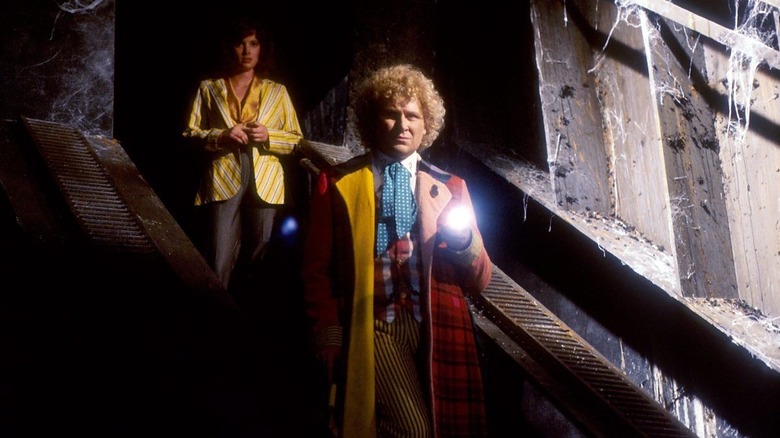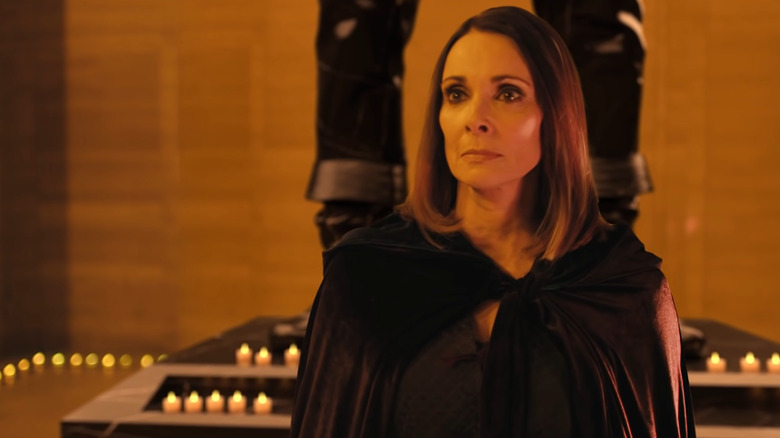Doctor Who Brought Back A Classic Companion After Three Decades
One of the defining features of "Doctor Who," for better or worse, is the show's tendency to undo death. Characters like the Master will meet their seemingly final, permanent ends about once or twice per decade, just to pop up again whenever the show feels like bringing them back. "Death is for other people, dear" was the explanation Michelle Gomez's version of the Master gave, after seemingly being blown up in the previous season's finale. Companions like Rory Williams (Arthur Darvill) and Clara Oswald (Jenna Coleman) died repeatedly throughout their time on the show, only to be brought back a few episodes later. (Sometimes, just a few minutes later.)
Classic "Who" tended to treat death with a little more respect, a little more permanence. When a companion died in the classic era, there'd rarely be any kind of time travel loophole that would bring them back to life. This was shown most clearly when long-term companion Adric (Matthew Waterhouse) was blown up in the 19th season's penultimate story "Earthshock," and was treated as dead for the rest of the show. While a modern Doctor would've used the Tardis to materialize around Adric in the nick of time (such as in a recent episode where the thirteenth Doctor did basically that), the fifth Doctor (Peter Davison) accepts it's too late the moment he sees the explosion.
Even Adric's death was later retconned, though. Big Finish's 2008 "Doctor Who" audio story "The Boy That Time Forgot" revealed that he wasn't blown up after all. Instead, he went on to live in an alternate universe the fifth Doctor accidentally created, before finally crossing back into the show's universe. Much like the revival show, the "Doctor Who" audio series couldn't seem to resist the urge to bring back the dead.
Although the original "Doctor Who" run rarely undid death, there is one major exception: Peri Brown (Nicola Bryant), whose death and resurrection in "The Trial of the Time Lord" serve as a prime example of the sloppy writing that made the sixth Doctor (Colin Baker) widely considered the worst in the show's history.
Peri's underwhelming departure
Peri's time as a companion was mostly spent in varying states of terror and misery. She was the companion who had to deal with the sixth Doctor's notoriously unpleasant behavior in the wake of his regeneration, where at one point he ended up nearly strangling Peri to death in a deranged fit of paranoia. Although Baker's Doctor softened up over the course of his time on the show, Peri wasn't given a lot of time to enjoy it. After having her body possessed by an alien entity in the first part of "The Trial of the Doctor," she was shot to death in what was meant to be a permanent end to her character.
This led to a ton of audience backlash, however, and the show quickly walked back the decision. Turn outs she wasn't actually dead; that was all just a trick pulled on the Doctor. Revealed to be alive, Peri ends up marrying the guy who shot her (King Yrcanos, played by Brian Blessed), and is abandoned by the Doctor to live the rest of her life with this angry warlord who doesn't seem to treat her particularly well. It understandably left a bad taste in audience's mouths, and is widely considered to be one of the most unsatisfying character arcs any major companion has ever gotten.
A retcon done well
In a promotional video for the upcoming collection of the classic show's season 22 (expected to be released some time this year), it's revealed that Peri lived a happy life married to King Yrcanos, becoming known among the planet Thordon as the "Warrior Queen." The clip establishes that she was known among her people as being "mightier even than the king," and that "she brought peace and prosperity" to the kingdom. Peri, still played by Nicola Bryant, explains how she returns to the kingdom every year with the help of the Doctor, who hadn't abandoned her after all.
While the revival of Adric felt like an undermining of his original death scene, these revelations about Peri are a lot easier to accept. Whereas Adric's fatal departure from the show was a historic moment, one that raised the show's stakes and gave the fifth Doctor some heartfelt grief to work through, Peri's departure simply came across as hollow and mean-spirited. Rather than feeling like an intrusion on important, established canon, "The Eternal Mystery" feels like a much-needed acknowledged that "Doctor Who" never did right by this character.
Although the treatment of Peri back in 1986 can never be fully undone — and it's unlikely fans will take a short promotional video as seriously as they would an actual episode of the show — we can at least appreciate the gesture. Over 30 years after she was clumsily written off the show, fans of Peri can finally get some closure.


